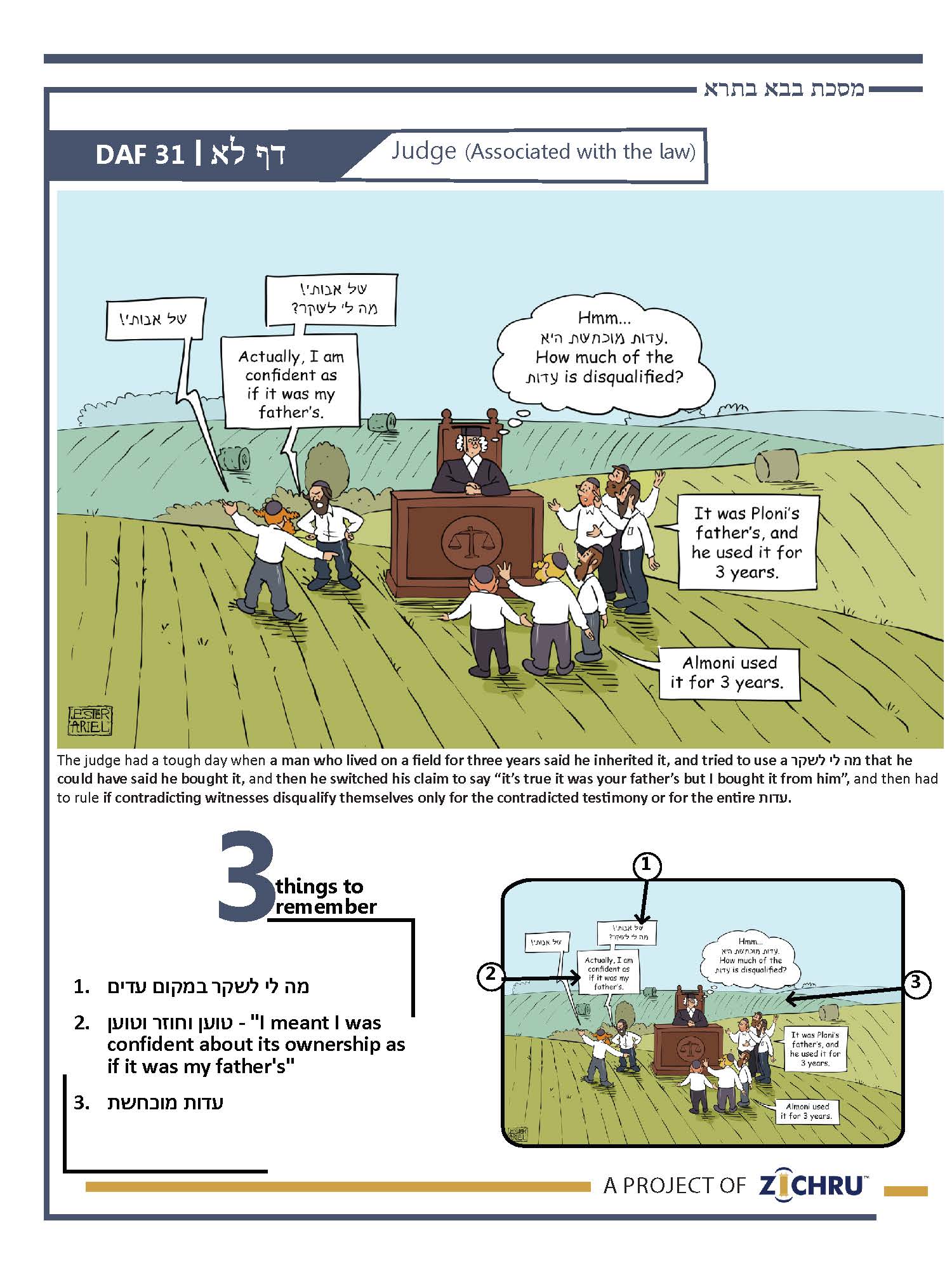Bava Basra - Daf 31
- Audio Timestamps
0:00 - The 3 Sugyos
2:47 - Review of 3 Sugyos
5:27- Siman
8:10 - 4 Blatt Back Chazarah
15:53 - Pop Quiz (Last 7 blatt)
For access to all Zichru resources including PDFs, and illustrations CLICK HERE
- מה לי לשקר במקום עדים
Two people disputed the ownership of a property, each one claiming של אבותי – “It was my forefathers’ property.” Witnesses testified that it belonged to one party’s fathers, and other witnesses testified that the other party had used the land for the three years of chazakah. Rabbah ruled: מה לו לשקר – What gain is there for [the occupant] to lie? אי בעי אמר ליה מינך זבנתה ואכלתיה שני חזקה – If he wanted to, he could have told [the other litigant], “I bought it from you, and used it for the three years of chazakah.” Since he could have retained the property with this false claim, he is believed to say that it was his fathers’. Abaye said to Rabbah: מה לי לשקר במקום עדים לא אמרינן – we do not say to believe a litigant based on the argument of “what gain is there for me to lie” in the place of witnesses contradicting his claim, because it is known to be false. The Rashbam says that Rabbah accepted Abaye’s argument.
- טוען וחוזר וטוען
In the above court case, the occupant then told the other, “Yes, it is true that the land once belonged to your fathers, but I purchased it from them. והאי דאמרי לך דאבהתי – And this that I told you that it was my fathers’, דסמיך לי עלה כדאבהתי – I meant that I was confident about its ownership as if it was my fathers’,” not that they literally owned it. With this new claim, his chazakah would award him the property. Ulla said: טוען וחוזר וטוען – one may make a claim and change and make another claim to reinterpret his original statement (against its apparent meaning), but the Nehardeans said he cannot. Ulla agrees that if the occupant explicitly said, “It was my fathers’ and not your fathers’,” he cannot reinterpret it. Similarly, if he left Beis Din, and only reinterpreted it after returning, he is not believed, because it is apparent that someone advised him to make this reinterpretation.
The Nehardeans agree that if the occupant reinterpreted his claim as "של אבותי שלקחוה מאבותיך" – it was my fathers’, who bought it from your fathers,” it is accepted, because it does not contradict his initial claim at all.
- עדות מוכחשת
Two men disputing a property each claimed they inherited it, and also used it for three years. Witnesses testified that it belonged to one party’s fathers, and he had used it for three years, and other witnesses testified that the other party had used it those three years, contradicting the first pair. Rav Nachman said the contradictory testimonies about chazakah are canceled, and the land is given to the party whose witnesses testified it was his fathers’. Rava protested: הא עדות מוכחשת היא – but this is contradicted testimony! Since one pair of witnesses lied, and is disqualified for all testimony, their other testimony also cannot be accepted!? Rav Nachman responded: נהי דאיתכחש באכילתה – although [the testimony] was contradicted regarding usage, באבהתא מי אתכחש – was it contradicted regarding fathers’ ownership? The Gemara suggests this machlokes parallels another. If two pairs of witnesses contradict each other, Rav Huna says: זו באה בפני עצמה ומעידה – this [pair] may come alone and testify elsewhere, וזו באה בפני עצמה ומעידה – and that [pair] may come alone and testify elsewhere. Neither is disqualified, because they retain their former status out of doubt. Rav Chisda said: בהדי סהדי שקרי למה לי – why should I be [involved] with lying witnesses? Neither pair can testify again, since one of them lied.
The Gemara responds that Rav Huna may agree that regarding this very testimony, the entire testimony is invalidated since part was contradicted.
Siman – Judge (Associated with the law)
The judge had a tough day when a man who lived on a field for three years said he inherited it, and tried to use a "מה לי לשקר" that he could have said he bought it, and then he switched his claim to say, “it’s true it was your father’s but I bought it from him”, and then had to rule if contradicting witnesses disqualify themselves only for the contradicted testimony or for the entire עדות.


